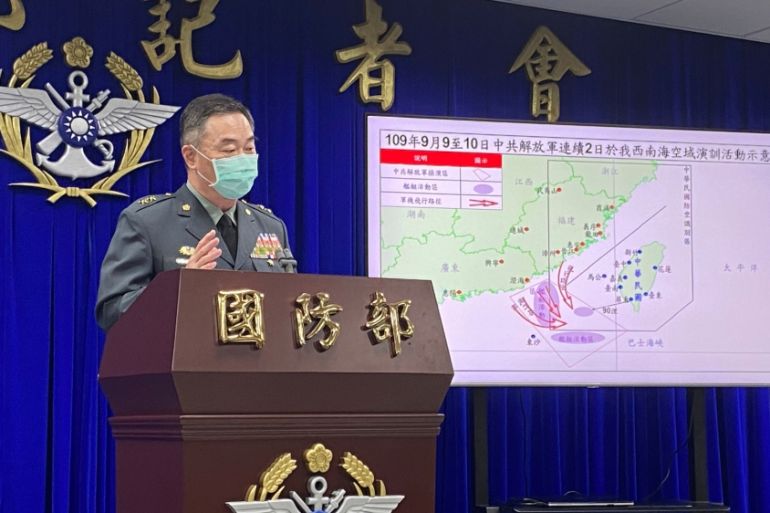China says military drills near Taiwan were a ‘necessary action’
Official says drills off Taiwan aimed at safeguarding China’s sovereignty and to warn against ‘foreign interference’.

Recent Chinese military drills off Taiwan’s southwest coast were a “necessary action” to protect China’s sovereignty, Beijing said on Wednesday, after Taiwan complained the large-scale air and naval exercises were a serious provocation.
China, which claims democratic Taiwan as its own, has stepped up military activities near the island, in actions Taiwan views as intimidation to force it to accept Chinese rule.
Taiwan denounced the two days of exercises last week, which it said took place in Taiwan’s air defence identification zone, between mainland Taiwan and the Taiwan-controlled Pratas Islands.
Taiwan says China sent advanced Sukhoi Su-30 and Chengdu J-10 fighter jets to participate.
Offering China’s first public explanation for the exercises, Ma Xiaoguang, spokesman for China’s Taiwan Affairs Office, said Taiwan was a “sacred” and inseparable part of China.
“The relevant combat training activities by the People’s Liberation Army were a necessary action aimed at the current security situation in the Taiwan Strait and to safeguard national sovereignty,” Ma told a news conference.
|
|
In an apparent reference to the United States, Taiwan’s main arms supplier and strongest international supporter, Ma said the drills were also aimed at “the interference of foreign forces” and Taiwan independence activities, not Taiwan’s people.
‘Troublemakers’
Taiwan’s government was allowing anti-China, Western forces to “play the Taiwan card” and become a pawn in stopping China’s development, stirring up enmity across the two sides of the strait and seeking Taiwan’s independence, Ma claimed.
“The situation between the sides at present is even more grave and complicated. The Democratic Progressive Party authorities and the Taiwanese independence forces are behind this,” Ma said, referring to Taiwan’s governing party, which was returned with a hefty mandate in elections earlier this year.
“They continue to provoke and are threat-makers and troublemakers,” he said.
“We have the determination and the capability to defeat all Taiwan independence activities and absolutely safeguard national sovereignty and territorial integrity.”
Taiwan President Tsai Ing-wen, who has warned of the risk of accidental conflict because of the increasing military activities, says the island is already an independent country called the Republic of China, Taiwan’s formal name.
The Pentagon also expressed concern about China’s drills last week. The US has been carrying out military activities near Taiwan, including sailing warships through the Taiwan Strait.
China cut contacts with Taiwan’s government following Tsai’s election in 2016, and has sought to isolate her diplomatically while ratcheting up political, military and economic pressure.
|
|
The more aggressive approach follows the apparent failure of its efforts to win over the island’s 23 million people to the prospect of political unification under the “one country, two systems” framework it uses in Hong Kong, with a large majority of Taiwanese favouring maintaining the status quo of de facto independence.
Birding row
Beijing has whittled Taiwan’s roster of diplomatic allies down to just 15 and blocked its representatives from attending international gatherings, demanding that Tsai agree to recognise Taiwan as a part of Chinese territory.
On Tuesday, Taiwan’s Ministry of Foreign Affairs spokeswoman Joanne Ou criticised British-based conservation group BirdLife International’s move to exclude Taiwan’s Chinese Wild Bird Federation as a result of the Chinese government’s “intervention and suppression regarding ecological conservation activities”.
“BirdLife International cooperated with China to oppress the wild bird society of Taiwan. Its political consideration is an obstacle to international conservation activities,” Ou said.
In a statement, the Chinese Wild Bird Federation said BirdLife had demanded it sign a document formally committing to not promote or advocate the legitimacy of the Republic of China, Taiwan’s formal name, or the independence of Taiwan from China.
“As an apolitical organisation which has never taken a stance on any such issue, we felt it was inappropriate to sign such a document and were unable to comply. We are not political actors, we are conservationists,” the federation said.
BirdLife International did not immediately respond to requests for comment.